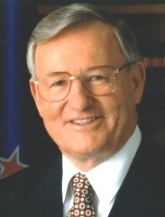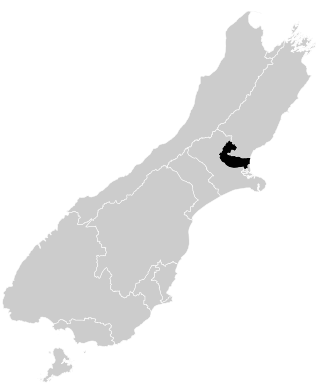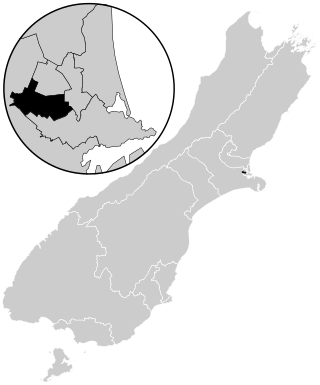Related Research Articles
The Alliance was a left-wing political party in New Zealand. It was formed at the end of 1991 by the linking of four smaller parties. The Alliance positioned itself as a democratic socialist alternative to the centre-left New Zealand Labour Party. It was influential throughout the 1990s, but suffered a major setback after its founder and leader, Jim Anderton, left the party in 2002, taking with him several of its members of parliament (MPs). After the remaining MPs lost their seats in the 2002 general election, some commentators predicted the demise of the party.

James Patrick Anderton was a New Zealand politician who led a succession of left-wing parties after leaving the Labour Party in 1989.

The 2002 New Zealand general election was held on 27 July 2002 to determine the composition of the 47th New Zealand Parliament. It saw the reelection of Helen Clark's Labour Party government, as well as the worst-ever performance by the opposition National Party. The 2020 election would see it suffer a greater defeat in terms of net loss of seats.

The 1999 New Zealand general election was held on 27 November 1999 to determine the composition of the 46th New Zealand Parliament. The governing National Party, led by Prime Minister Jenny Shipley, was defeated, being replaced by a coalition of Helen Clark's Labour Party and the smaller Alliance. This marked an end to nine years of the Fourth National Government, and the beginning of the Fifth Labour Government which would govern for nine years in turn, until its loss to the National Party in the 2008 general election. It was the first New Zealand election where both major parties had female leaders.
Jim Anderton's Progressive Party was a New Zealand political party generally somewhat to the left of its ally, the Labour Party.

The New Zealand Social Credit Party was a political party that was New Zealand's third party from the 1950s to the 1980s. It was elected to the New Zealand House of Representatives, holding one seat at times between 1966 and 1981, and two seats from 1981 to 1987. It was named the New Zealand Democratic Party from 1985 to 2018, and was part of the Alliance party from 1991 to 2002. It returned to the Social Credit name in 2018. The party deregistered itself in early 2023.

The 1996 New Zealand general election was held on 12 October 1996 to determine the composition of the 45th New Zealand Parliament. It was notable for being the first election to be held under the new mixed-member proportional (MMP) electoral system, and produced a parliament considerably more diverse than previous elections. Under the new MMP system, 65 members were elected in single-member districts by first-past-the-post voting, while a further 55 "top-up" members were allocated from closed lists to achieve a proportional distribution based on each party's share of the nationwide party vote.
Stephnie de Ruyter is a former leader of the New Zealand Democratic Party, a small centre-left New Zealand political party based upon Social Credit economics. The Democrats, who, in June 2018, returned to campaigning under the name Social Credit are currently outside Parliament.

Laila Jane Harré is a New Zealand politician and trade unionist. She was the first leader of the Internet Party, and stood for Parliament in the 2014 general election through the Helensville electorate. From 1996 to 2002, she was a member of parliament for the Alliance party, briefly leading that party after the group experienced a schism in 2002.

The 1993 New Zealand general election was held on 6 November 1993 to determine the composition of the 44th New Zealand Parliament. Voters elected 99 members to the House of Representatives, up from 97 members at the 1990 election. The election was the last general election to use the first-past-the-post electoral system, with all members elected from single-member electorates. This was the last time prior to the 2020 election where a party won an absolute majority of seats.

The 2005 New Zealand general election on Saturday 17 September 2005 determined the membership of the 48th New Zealand Parliament. One hundred and twenty-one MPs were elected to the New Zealand House of Representatives: 69 from single-member electorates, including one overhang seat, and 52 from party lists.
The New Zealand Liberal Party founded in 1991 was a splinter group of the National Party.
Matthew Peter Robson is a New Zealand politician. He was deputy leader of the Progressive Party, and served in the Parliament from 1996 to 2005, first as a member of the Alliance, then as a Progressive.
Grant Gillon is a former New Zealand politician. He was a member of parliament between 1996 and 2002, representing the Alliance Party, has held a number of seats in local government. He previously served on the Devonport-Takapuna Local Board representing Shore Action.
Richard James Gerard is a former New Zealand politician. He was a National Party Member of Parliament from 1984 to 1997.

Waimakariri is a New Zealand parliamentary electorate, formed for the 1996 election and returning one Member of Parliament to the New Zealand House of Representatives. The MP for Waimakariri is Matt Doocey of the National Party. He has held this position since the 2014 election and takes over from Kate Wilkinson, who defeated Clayton Cosgrove (Labour) in the 2011 election.

Wigram is a New Zealand parliamentary electorate, returning one Member of Parliament to the New Zealand House of Representatives. The current MP for Wigram is Megan Woods of the Labour Party. She took over this position from Jim Anderton, who had held this position from 1996 until 2011.
Although the Democratic Alliance of South Africa in its present form is fairly new, its roots can be traced far back in South African political history, through a complex sequence of splits and mergers.
The Timaru by-election of 1985 was a by-election for the electorate of Timaru during the term of the 40th New Zealand Parliament. It was triggered by the death of Sir Basil Arthur on 1 May 1985. Sir Basil was Speaker of the House, and had inherited the rank of baronet from his father in 1949.

A by-election was held in the New Zealand electorate of Christchurch East on 30 November 2013. The seat was vacated following the resignation of Lianne Dalziel of the Labour Party from parliament, who contested and won the Christchurch mayoralty in October 2013.
References
- Who's Who in the New Zealand Parliament 1996. Wellington: Parliamentary Service. 1996.